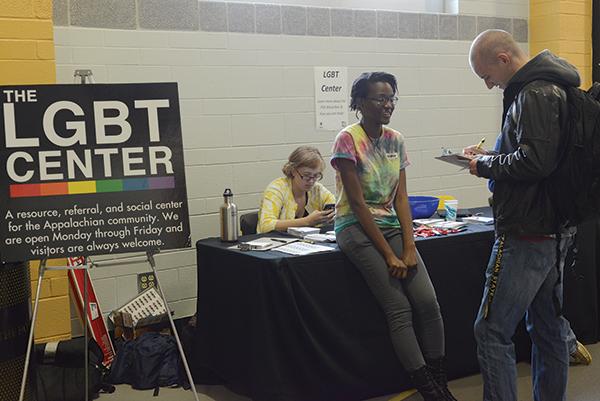
The LGBT Center at Appalachian State University received 942 signatures Wednesday asking the FDA to remove the ban, which prevents MSM – or men who have had sex with men – from being eligible to donate blood.
Each year, the center tries to match the number of pints donated with signatures, but in the past three years they have not been able to reach that goal.
This is the fourth year the petition has been held during the annual homecoming blood drive.
But this year, the center wants to focus on spreading knowledge about the ban rather than focus on a specific number, said Elaine Blevins, senior anthropology major and co-chair of the event.
The LGBT Center also made other changes to the petition this year.
“This is the first year that we’ve had a petition that meets FDA regulations,” she said. “In order for a petition to be considered by the FDA, it has to meet a certain set of guidelines. So we’re following those guidelines.”
These requirements include a signature of every person who signs the petition. There is also a specific format the petition must follow, according to fda.gov.
The LGBT Center will also take the signed petitions to the FDA headquarters in Rockville, Md., instead of mailing them or using an online petition, Blevins said.
While there is no official date to take the signed petitions, Blevins hopes to take them within the next two weeks, she said.
The center also hosted a social justice coffee hour Sept. 18 to spread awareness about the ban and the petition. This event was completely full and included panels of people who identify as MSM, who spoke about the ban and how it affects them, Blevins said.
Each petition is a postcard-sized piece of cardstock, with the petition and a place for a signature and address. The visual of multiple petitions has a greater impact than just an online petition, said Emilee Gribben, senior sociology major and co-chair of the event.
“This year we went back to postcards because we like the visual impact,” Gribben said.
The LGBT Center’s graduate assistant Sarah Magness said talking about the ban is important because most people don’t know about.
“We need to spread the word on this issue, so that enough people can petition the FDA and get the screening process to focus on unsafe sex practices instead of [the] gender of sexual partner,” she said.
Magness said she will continue to double donate as much as possible for those who aren’t able to. Double donation is a process in which a special machine is used to collect two units of red blood cells in one donation, according to redcrossblood.org.
“Today, I’m helping collect signatures from individuals when I’m not in class, and I’m also donating doubles for my friends who are not allowed to give,” she said. “I will continue to donate doubles as often as I am allowed until the MSM ban can be lifted. Blood resources are so vital, and thinking that my friends and colleagues cannot donate is really heart-wrenching.”
Story: CHELSEY FISHER, Senior News Reporter
Photo: COURTNEY ROSKOS, Senior Photographer

